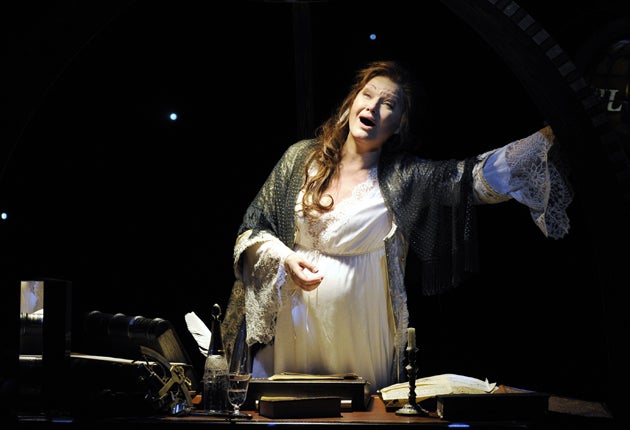Emilie, Opéra National de Lyon, Lyon, France
An opera for one voice seems an odd vehicle for the eye-popping story of an extravagant intellectual

Written for Karita Mattila and premiered in Lyon, the solo-voice opera Emilie opens with the fevered scratch of a pen.
Here is the Marquise du Châtelet, writing late into the night, her swollen belly hidden from society in the Queen of Poland's apartment at Lunéville. Physicist, philosopher, linguist and astronomer, author of a dissertation on light, a discourse on happiness and the first translation of Newton's Philosophiae Naturalis Principia Mathematica, she has ordered her papers, fearing imminent death. At the age of 43, after 17 summers of accident-free amorous adventure, "la divine, la sublime Emilie" is about to give birth.
Though billed as Kaija Saariaho's third opera, Emilie is a sister-piece to La Passion de Simone (2006), a blue-stocking monodrama about the tension between intellect and nature. Where the philosopher Simone Weil found grace in self-denial (a trait reflected in Saariaho's music), Emilie du Châtelet was a woman of extravagant appetites. Having married strategically, she began a life of academic and erotic independence. When Voltaire, her hypochondriac soul-mate, was unable to indulge her needs, she took other lovers, lost and won fortunes at gaming tables, splurged on diamonds and snuff boxes. Admirers speak of her subtle wit, enemies of an inelegant snob who hounded her former lovers with threats of suicide. Sadly, this tireless, contradictory character is not the one painted by Saariaho and her librettist Amin Maalouf.
"Calm and mysterious" is the marking as alto flute and strings shimmer in orbit around Mattila's first half-voiced syllables and the amplified harpsichord that links the nine scenes. This is the music of celestial spheres and mathematical formulae, while the pangs of an ultimately fatal pregnancy are – I fancy – hinted at in a musky brew of muted brass. As a constellation of philosophers, physicists and poets aligns around Emilie's éscritoire, Mattila's voice is doubled electronically in a wry, dry tenor as she quotes Voltaire and a high, naive soprano as she speaks to her unborn child – the most poignant and original moment in the score.
Neither Saariaho nor director François Girard encourages histrionics. Mattila's imperious sound is seldom at full tilt, and her Bess of Bedlam wig-pulling and back-arching (in the third trimester!) seem out of place in this understated setting. Conductor Kazushi Ono and Lyon's excellent chamber orchestra emphasise the sensuality of the score's baroque references – the fretful rhythms and verdant trills of Rameau, Purcell and Scarlatti. Yet it's hard to avoid the impression that Saariaho and opera have a square-peg, round-hole relationship. Running time from opening pen-scratch to final contraction is 72 minutes, though when Emilie reaches London next year, my guess is it will be shorter.
Next Week:
Anna Picard has low hopes for political correctness as English Touring Opera unveils its new production of Donizetti's ageist, fattist comedy Don Pasquale
Join our commenting forum
Join thought-provoking conversations, follow other Independent readers and see their replies
Comments